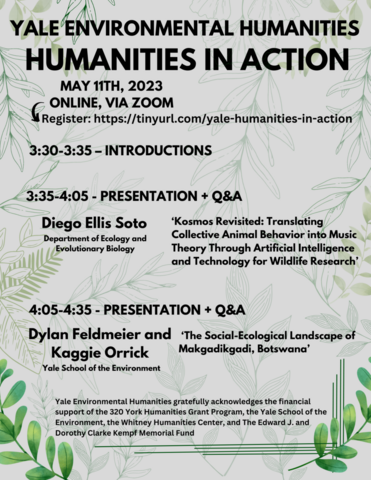Yale Environmental Humanities is delighted to host a “Humanities in Action” panel featuring speakers discussing two recent environmental humanities projects supported by the Environmental Humanities Grant Program.
3:30 pm to 4:30 pm
Online via zoom, register here
———————
Schedule:
3:30-3:35 – Introductions
3:35-3:50 - Presentation by Diego Ellis Soto
3:50-4:05 - Q&A w/moderator and questions from audience
4:05-4:20 - Presentation by Dylan Feldmeier and Kaggie Orrick
4:20-4:30 - Q&A w/moderator and questions from audience
———————
Abstracts:
- Diego Ellis Soto, Department of Ecology and Evolutionary Biology
‘Kosmos Revisited: Translating Collective Animal Behavior into Music Theory Through Artificial Intelligence and Technology for Wildlife Research’
To communicate the lives and sounds of animals, and the threats they face by warming climates and human activities, this project combines artificial intelligence, natural history and musical theory. Jointly with musicians, sound engineers, biologists and artists, Ellis Soto has created new ways of expressing animal behavior into musical patterns and artistic expressions. This project will be displayed in the form of two art galleries at Yale (CCAM and TSAI) and involve New Haven youth. In addition, planned interdisciplinary dialogue across the arts, humanities and sciences will pave new ways of representing nature and its unique beauty.
——-
- Dylan Feldmeier and Kaggie Orrick, Yale School of the Environment
‘The Social-Ecological Landscape of Makgadikgadi, Botswana’
